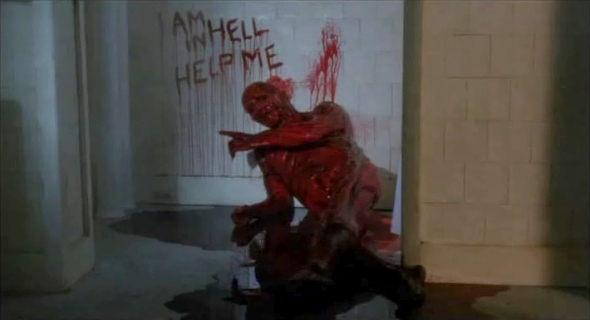Matthew Brady’s done a couple of short film reviews today in comments. I like them both, so thought I’d highlight them here:
First, on Hellraiser. (Halloween appropriate!)
Aaron: I like your take on both Hellraiser films (well, the first two, anyway; I don’t think I’ve seen any of the others, except maybe one of the sequels, called Hellraiser: Generations, I think, that I watched years ago on cable. It was all right). The first one was definitely more effective, but they both had their moments, especially in the way they sexualized their horror, making people with their skin flayed off alluringly sensual and lingering on the viscous parts of the exposed bodies. The most effective scene in the sequel was probably the bit in which one of the rooms in hell had beds that kept sliding out of holes in the wall, with female bodies writhing erotically under sheets (which sort of resembled body bags) on the beds, but covered with blood, making for a gross necrophiliac combination. Both films suffer from becoming action spectacles in their climaxes, which cheapens the unknowable horror of hell, making it a threat that can be solved by manipulating a demonic Rubik’s cube or just outrunning the waves of evil. That sort of thing is probably necessary, but if you’re going to sell hell as an inescapable realm of suffering (although I guess there are several people who do escape, so maybe that’s not the case?), the movie should end with everyone meeting a horrible end as a true nightmare of what is to come for everyone after they die (or are dragged into a nether dimension after delving into supernatural affairs in which man should not meddle). That’s not really what these movies are about, since they kind of squeeze themselves into a Hollywood slasher formula, but that’s what I would prefer, even if it’s easier said than done.
And then on Cloud Atlas.
I saw the movie last night, and it was pretty enjoyable, although, as you said, the message is ultimately pretty shallow. I haven’t read the book, but it seems like the stories might have been improved by being intercut throughout, rather than presented discretely. Or maybe they just seem to work better when we only see a few minutes of them at a time, and the clever callbacks and references can be highlighted and underlined by jumping directly between them. Plus, the motif of reincarnation and recurring tropes can be highlighted by casting the same actors in multiple roles in each story (Hugo Weaving and Hugh Grant are always bad guys, Halle Berry and Jim Sturgess are always good, Jim Broadbent and Tom Hanks go back and forth). Ultimately, I don’t know how well it worked, or if it was really that good of a movie, but it was certainly an experience. I liked it for the most part, with my favorite aspect probably being how hammy Tom Hanks was in every role except one, and that guy died five minutes after he was introduced. I guess I recommend it?

